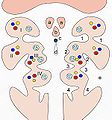| This article needs additional citations for verification. Please help improve this article by adding citations to reliable sources. Unsourced material may be challenged and removed. Find sources: "Pharyngeal pouch" embryology – news · newspapers · books · scholar · JSTOR (April 2009) (Learn how and when to remove this message) |
| Pharyngeal pouch | |
|---|---|
 Pharyngeal pouches in embryonic development schematic at Carnegie stage 16 Pharyngeal pouches in embryonic development schematic at Carnegie stage 16 | |
 Pouches and arches depicted at earlier stages Pouches and arches depicted at earlier stages | |
| Details | |
| Carnegie stage | 10 |
| Identifiers | |
| Latin | sacci pharyngei |
| TE | pouch (embryology)_by_E5.4.2.0.0.1.1 E5.4.2.0.0.1.1 |
| FMA | 293063 |
| Anatomical terminology[edit on Wikidata] | |
In the embryonic development of vertebrates, pharyngeal pouches form on the endodermal side between the pharyngeal arches. The pharyngeal grooves (or clefts) form the lateral ectodermal surface of the neck region to separate the arches.
Specific pouches
First pouch
The endoderm lines the future auditory tube (pharyngotympanic Eustachian tube), middle ear, mastoid antrum, and inner layer of the tympanic membrane. Derivatives of this pouch are supplied by Mandibular nerve.
Second pouch
- Contributes the middle ear, palatine tonsils, supplied by the facial nerve.
Third pouch
- The third pouch possesses dorsal and ventral wings. Derivatives of the dorsal wings include the inferior parathyroid glands, while the ventral wings fuse to form the cytoreticular cells of the thymus. The main nerve supply to the derivatives of this pouch is cranial nerve IX, glossopharyngeal nerve.
Fourth pouch
Derivatives include:
- superior parathyroid glands and ultimobranchial body which forms the parafollicular C-Cells of the thyroid gland.
- Musculature and cartilage of larynx (along with the sixth pharyngeal arch).
- Nerve supplying these derivatives is Superior laryngeal nerve.
Fifth pouch
- Rudimentary structure, becomes part of the fourth pouch contributing to thyroid C-cells.
Sixth pouch
- The fourth and sixth pouches contribute to the formation of the musculature and cartilage of the larynx. Nerve supply is by the recurrent laryngeal nerve.
Additional images
-
 Pattern of the branchial arches. I-IV branchial arches, 1–4 pharyngeal pouches (inside) and/or pharyngeal grooves (outside)
Pattern of the branchial arches. I-IV branchial arches, 1–4 pharyngeal pouches (inside) and/or pharyngeal grooves (outside)
a Tuberculum laterale
b Tuberculum impar
c Foramen cecum
d Ductus thyreoglossus
e Sinus cervicalis -
 Floor of pharynx of human embryo about twenty-six days old.
Floor of pharynx of human embryo about twenty-six days old.
See also
References
- Endocrine Glands Archived 2008-03-14 at the Wayback Machine
External links
- Swiss embryology (from UL, UB, and UF) rrespiratory/korperhohlen01 (Item #1 at Fig. 14)
- Embryology at Temple parch98/ARCHII97/sld017
- hednk-021—Embryo Images at University of North Carolina
- hednk-022—Embryo Images at University of North Carolina
- Outline at howard.edu (scroll down to "III. THE PHARYNGEAL POUCHES")
| Development of the head and neck | |||||||
|---|---|---|---|---|---|---|---|
| Face | |||||||
| Mouth |
| ||||||